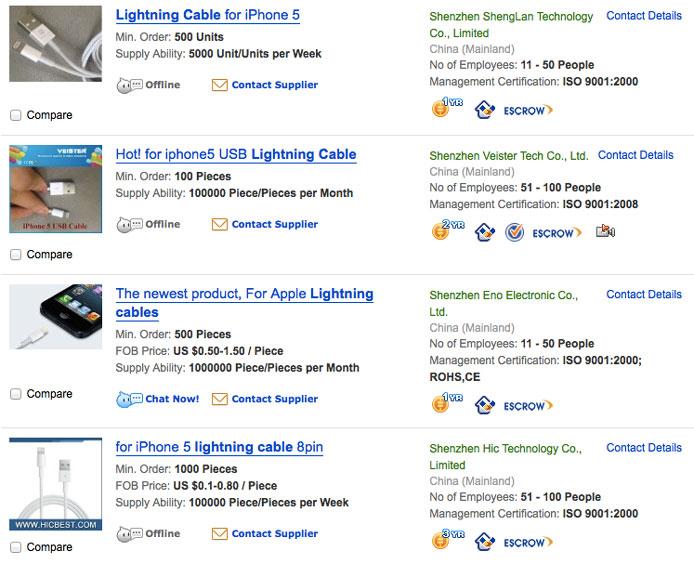Though some websites are selling what are claimed to be inexpensive third-party cables compatible with Apple's new Lightning port, accessory makers have not yet reverse engineered the chip found inside Apple's official cables.
Websites like China's Alibaba.com currently have a number of companies claiming to offer their own inexpensive Lightning cables for sale. Some suppliers on these sites are advertising that new orders for third-party cables will ship in less than a month, but evidence suggests those deadlines will not be met.
One supplier contacted by Peter of Double Helix Cables indicated that their company plans to begin working to clone Apple's Lightning authenticator chip in earnest after China's Mid-Autumn Day national holiday, which will be recognized on Sept. 30.
Realistically, Chinese companies looking to make cloned Lightning cables won't be able to produce any products for at least two months, according to Peter.
He said that although resellers on eBay and Amazon may claim they currently have the product in hand, it's not possible, as no suppliers have to his knowledge begun manufacturing third-party Lightning cables.
"People should be very surprised if this cable can be cloned by Christmas," Peter told AppleInsider. "This is a serious undertaking and the Chinese know it."
Some companies began advertising accessories such as Lightning to 30-pin adapters on Amazon less than a week after the iPhone 5 was unveiled. Once such accessory, the Nanotch adapter, is advertised to be released on Oct. 17 — a date Peter believes could not be met.
Apple's new Lightning cables feature chips embedded in the accessory. The exact purpose of the chips remains unknown, but it's been speculated that they could be used to make it impossible for third-party accessory makers to build Lightning cables without Apple's authorization.
The new Lightning connector found on the iPhone 5, as well as the forthcoming iPod touch and iPod nano updates, is 80 percent smaller than Apple's legacy 30-pin connector, which lasted for nearly a decade. Apple's new cables are digital and dynamically assign pins to each side of the plug, allowing it to be inserted into a device in either of two orientations.
 Neil Hughes
Neil Hughes







-m.jpg)






 Christine McKee
Christine McKee
 Malcolm Owen
Malcolm Owen

 Charles Martin
Charles Martin


 Mike Wuerthele
Mike Wuerthele


-m.jpg)






41 Comments
Guess what will happen that Apple does not want. Somebody will buy a cheap $5 knockoff, put it in the shiny iP5 and cause it to burn-up or damage it and try taking it to an Apple store and say the phone was "defective" when in fact, trying to save a few bucks and go cheap ends up costing a lot more. In the end, the consumer will blame Apple.
In the end, the consumer will blame Apple.
Probably the same kind of people that would put their iPhone in their pocket along with their keys and then proceed to whine about how it's all scratched up.
Probably the same kind of people that would put their iPhone in their pocket along with their keys and then proceed to whine about how it's all scratched up.
Hmm... interesting. Do you think those kind of people might be related to the other kind of people that drop their iPhone on concrete and and then whine (i.e. "blame Apple) about it getting a dent?
Good luck Chinese! Hope this happens asap, wish apple would release the specs so consumers could have more options for cables, save money.
Hmm... interesting. Do you think those kind of people might be related to the other kind of people that drop their iPhone on concrete and and then whine (i.e. "blame Apple) about it getting a dent?
I think that you're on to something there!
As a matter of fact, I believe that they're the same people. The same people who were dropping their glass backed iPhone 4's on concrete are most likely the same sort of people that will scratch up their aluminum backed iPhone 5's.